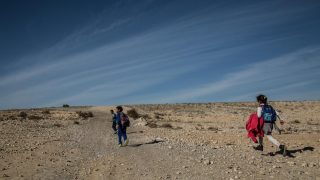Egyptian Prime Minister Hazem el-Beblawi announced that Gulf commitments to provide funding for his country — estimated at $12 billion — are being carried out and that negotiations to fund various commercial projects are being held. The flow of aid, accompanied by a new transitional political phase, has stirred enthusiasm, which was soon translated into an increase in Egyptian stock-exchange prices and widespread optimism in regard to pulling the Egyptian economy out of its deep crisis.
Is it really possible to help the Egyptian economy via this funding? Will this pave the way for the formation of a political regime that is more stable, within an environment of rapid political turnover and high social demands? The management of financial crises is first and foremost a political matter, linked to how the authority distributes resources. The extent to which the Gulf aid will be beneficial is related to the time frame and the form of investments in the medium term. In summary, the question concerning the economy in Egypt is not technical but political, and it is closely related to restructuring macroeconomics in favor of establishing a clearly structured social base for a political regime that is more stable.
Morsi’s one year of rule: inefficient economic policies
The primary feature characterizing the rule of former President Mohammed Morsi was the clear inclination toward increasing debt — in all its forms — as a way of responding to the crisis. A report released by the Egyptian Initiative for Personal Rights (EIPR), which discussed the economic situation during that period, noted that the gateway to solving the economic crisis was limited to filling the growing budget deficit through short-term measures and heavy reliance on loans, instead of designing policies that deal with the roots of the Egyptian economy’s structural crisis.
This approach of dealing with the crisis has in fact catalyzed two forms of indebtedness. The first was represented by the relentless pursuit of a $4.8 billion loan from the International Monetary Fund (IMF). This loan was subject to a number of conditions targeting the adoption of austerity measures to decrease the government’s expenditures and imposing new taxes. The government sought to respond to these conditions through espousing steps aimed to increase gas and diesel prices used in heavy industries, as well as increasing taxes on specific goods. The steps also included the implementation of a rationing program on fuel subsidies.
All of these measures witnessed popular opposition, leading the government to renege. Inflation, however, caused prices to increase, elevating popular wrath against Morsi. As a result, the government could not meet the conditions and the IMF suspended negotiations on loans and postponed disbursements indefinitely. As the report deduced, the pursuit of the loan was based on the idea that it would give the government a pass for additional funding.
In other words, the loan was a temporary solution to be followed by more temporary solutions. The second form of indebtedness was represented by reliance on citizens to fill the budget deficit. The figures of Egypt’s general budget witnessed an unprecedented downgrade due to high rates of internal and external debt. According to a Finance Ministry report, the budget deficit reached 11.8% of GDP between May and July 2013, leaving the deficit standing at 204.9 billion Egyptian pounds ($29.7 billion), compared with 136.5 billion pounds ($19.8 billion) during the same period last year. This deficit was mainly filled by means of internal indebtedness, through the issuance of bonds and treasury bills, loans from local banks or the deposits of Egyptian citizens. Again, this excessive inclination toward internal indebtedness was reflected by the figures of the Finance Ministry: the total domestic public debt increased from 1.0527 trillion pounds ($153 billion) in March 2012 to 1.3422 trillion ($195 billion) in March 2013.
Furthermore, the Muslim Brotherhood assuming power had resulted in the flow of aid from specific countries, mainly Qatar. Qatar pumped $8 billion of aid into Egypt under Morsi's rule. This financial support falls under the category of political sponsorship. It is worth noting that the Central Bank of Egypt recently returned a Qatari deposit of $2 billion as a sign that sponsorship sources have changed since Morsi’s ouster. In conclusion, this aid — along with the debts Morsi inflicted on the Egyptian treasury — could not serve as a practical response to the daily needs of Egyptians. It instead resulted in the outbreak of popular anger, leading to the deposing of Morsi a year after his election.
From a rentier state to a 'tax collector' state
This prompts a question related to the way the authorities manage their finances within a political setting. When any authority announces its general budget, it mentions the sources of revenues and the aspects of expenditures, which, in fact, reflect the relationship between authority and society. The state’s tax resources and the nature of the resulting taxable income specify the pattern this authority is espousing to redistribute wealth and subsequently the nature of social rules on which it is based. More than two decades ago, Beblawi, the current prime minister, wrote a thesis about the rentier state. In this thesis, he attributed the totalitarian aspects of Arab countries to their heavy reliance on renting resources — such as oil revenues — to external clients, thus meaning that society is of no need to these governments. The concept of rent surpassed its known definition in the classical economic sense to include the resources acquired by the state due to its strategic position or political roles played outside its borders.
In his important study “The Strong Regime and the Weak State,” researcher Samer Soliman deduced through observing the revenues of the Egyptian state throughout three decades that the rentier state model has dwindled in favor of the tax state. After decades of the Egyptian state’s heavy reliance on rent resources and aid that can be classified as political sponsorship, it was transformed into a state collecting taxes from its citizens because it simply lost a wide range of its revenues.
Soliman noted that this pattern of chronic budget deficit and resorting to internal indebtedness to solve it, which were transformed into structural aspects of the Egyptian economy, have contributed to the regime losing what he called “political buying power.” The regime is no longer able to provide for society due to the regression of its social umbrella. This has contributed to the rise of social powers separate from the regime, which can constitute a financial infrastructure for a democratic change in Egypt. Today, as Gulf aid is pumped into the Egyptian economy, the framework set by Soliman questions the usefulness of this aid and its capabilities to push toward the formation of a more stable regime amid social and financial crises.
A Marshall Plan?
In a recent report issued by Standard & Poor’s, a company specialized in publishing financial research on various countries, the state of the Egyptian general budget was described as “very weak.” The agency attributed this to the heavy burden on the budget from the governmental subsidy system and the high public-debt service. The report shows that the ability of the Egyptian state to increase its revenues and decrease its expenditures as a means to solve this problem remains limited. When discussing the effect of the latest Gulf aid, it concludes that the pressure on the local currency — which lost 17% of its value since the beginning of 2011 — will ease. The report notes as well that this aid will reduce the likelihood that Egypt will face a balance-of-payments crisis.
One of the most serious structural problems the Egyptian economy is facing is its reliance on foreign countries. Egypt imports around 60% of its food items and 40% of its fuel. These figures explain the crisis in the balance of payments, which includes an accounting record of all monetary transactions with the rest of the world. Egypt has a very large consumer market, and to assume that the recent foreign aid from the Gulf might contribute to a profound recovery of its economy seems a bit optimistic. In fact, such foreign aid represents at best a limited and short-term balancing mechanism for a chronic currency crisis in which the nation is unable to pay for essential imports. Typically, recovery from such a crisis broadly depends on the extent to which Gulf countries are committed to providing Egypt with further assistance. After all, financing such a huge economy requires a constant influx of billions of dollars.
Omar Adli, an Egyptian researcher in political economy, agrees with this perception. He stressed that the policy of cash assistance to finance Egypt's imports of basic commodities will not solve the problem and failed to save Morsi and his regime. However, Adli pointed to the statements of Deputy Prime Minister Ziad Bahaa El-Din regarding a potential Egyptian "Marshall Plan" with Gulf funding. He believes that in the medium term, the economic solution might lie in the conceptualization of the current ruling elite to harness the Gulf funding in order to consolidate the pillars of the political system, by replaying the scenario of the early 1990s. This is when Egypt, which was on the brink of bankruptcy, benefited from the flow of Gulf aid and paid off half of its debt (which amounted to nearly $45 billion), as a result of its role in the Gulf War. Egypt was later pushed to restructure its economy on the basis of the structural adjustment program, designed by international institutions.
An Egyptian Marshall Plan requires huge capital inflows, major investments in infrastructure and a comprehensive restructuring of public finances. Undoubtedly, it is now difficult to visualize the political system that would emerge from such a project, as it is still unknown how far the Gulf States are ready to finance the project. However, a large aid package is likely to revitalize the Egyptian economy or alleviate its problems, at least partially. This aid can also provide a basis for the emergence of a form of “conservative democracy" based on social groups seeking stability, taking into account the role that will be played by the army, which enjoys considerable popularity today.
Nevertheless, the problem of this scenario lies in the fact that it will only serve as an interim solution, as it will not be able to absorb all the sources of political and social tension in Egyptian politics after the revolution.
Solving the economic problems in Egypt, and thus the nature of the political system that can result from this process, is an issue that is much larger than the budget deficit, the feasibility of rentier policies and foreign aid. We learned from the Egyptian experience of structural reform that solving the problem of the Egyptian economy is not a technical issue. It is rather a political issue linked to rebuilding institutional arrangements governing the relationship of the state and society. This necessitates the emergence of specific social groups, which would express their interests in a specific manner, have clear a perception of politics, propose a development model for the economy and are prepared to struggle to integrate these perceptions in the structure of the future system.
The collapse of Egyptian state revenues and the decline of its social umbrella, coupled with market liberalization measures in the last two decades, resulted in certain social groups — such as the middle class — gaining independence from the state structure, as they succeeded in making their own way in the business sector.
However, at the same time, it had also led to the increasing impoverishment of the lowest social classes. As a result of the chaotic nature that characterized the liberal transformation process in the early 1990s, the Egyptian capitalism that emerged afterward was deformed. It tended to be closely allied with bureaucracy, reluctant to take initiatives and to have possessed perceptions closer to conservative politics. Moreover, the current wave of support of the army made us think that the “conservative" … is gaining a real voice in Egyptian politics.
The large funding sources in the foreseeable future could help mitigate the crisis and prepare the ground for a temporary, conservative political system. However, it is important to monitor the position of the lower social classes, which make up a large proportion of Egypt, in addition to the middle class segment that provide more radical change perceptions. Thus, in order to build a more democratic political system, the interests of these social segments ought to be included in the system. This is a process that cannot be achieved without building new institutions, thus redrafting the entire social contract. Rentier policies could fill your car with fuel, but they will not build schools, hospitals and modern institutional administrations. This is a totally different story.
Translated by Al-Monitor





